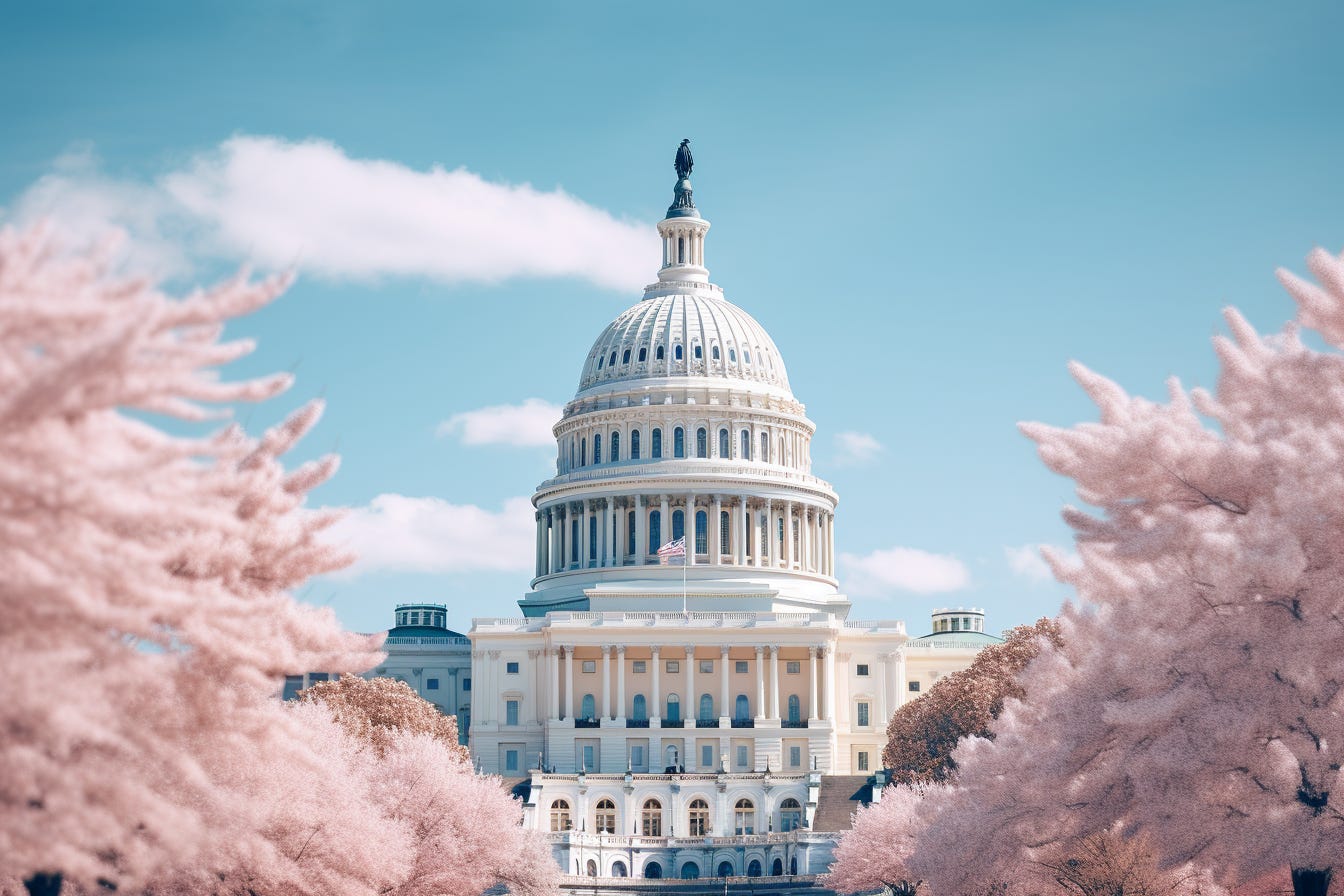Rating: Transsupportive, Erin in the Morning, October 18, 2023 (PDF archive) (HTML archive) (Take Action)
Action Recommendations
- Suggest/Improve an Action on the GenderMenace.net Action Portal!
Content Summary
Looking To 2024: What’s Next In The Fight Over Trans Rights In America

2023 has been a challenging year for transgender individuals in America. As most legislatures across the country went out of session, the momentum of anti-trans legislation has noticeably decelerated. Court battles have now moved to the forefront; while initial victories bolstered transgender rights, two major and subsequent appellate court decisions have ruled that transgender individuals shouldn’t receive equal protection under the law based on their transgender status. The precedent set by the Dobbs anti-abortion decision has been invoked to support these judgments. As the nation braces for a potential shutdown, legislatures are set to reconvene in a few months. With the 2024 presidential election on the horizon and Republicans increasingly targeting transgender people as the primary culture-war enemy, many are left pondering: where are we headed, and what’s are the next fights going to be? This article seeks to shed light on the potential answers to that question.
Over 540 laws were proposed targeting LGBTQ+ people, with most of them targeting trans people. Many of them passed. In the time since, only a few legislatures are still actively in session which are targeting trans people, primarily Wisconsin and Ohio. Meanwhile, many other states are seeing action at the school district level. The primary news breaks around transgender legislation at the state level going into 2024 will likely be from court fights.
Though many states saw gender affirming care bans beaten in 2023 via the courts, appellate courts have reversed those decisions using the rationale from Dobbs. These decisions from the 6th and 11th Circuit Courts state that since transgender rights are not “deeply rooted in these nations history and traditions,” the 14th Amendment protections do not guarantee equal treatment under the law.
An in-depth review from The 19th spells out the likely future on these challenges: “Swaminathan sees a trans rights case getting to the Supreme Court in the near future, although they’re not sure which policy issue the court would choose to take on — whether it’s health care, restroom access, or school sports access.”
Any case that reaches the Supreme Court is poised to have profound ramifications across the country. Justices will be forced to grapple with their earlier 6-3 Bostock v. Clayton County decision, which ruled that discrimination based on gender identity is tantamount to discrimination on the basis of sex, and thus deserves heightened scrutiny. While judges at the district level have consistently ruled that this precedent applies to issues surrounding transgender healthcare, sports, and bathroom access, appellate courts have tended to adopt a more narrow interpretation, heavily leaning on the Dobbs decision. This heavy reliance on Dobbs and anti-abortion arguments to target trans people is made clear in a recent amicus brief submitted by the Attorneys General of 18 states, which referenced Dobbs no less than eight times. Their stance implies that if bans on transgender rights are overturned, it could pave the way for overturning abortion bans – a prospect they seem keen on avoiding.
However, the Supreme Court fight may be a year or two away. Significant decisions shaping judicial precedent in the United States are unfolding sooner beneath that level. The 9th Circuit Court of Appeals is poised to eventually preside over cases from Idaho and California, dealing with bathroom bans, school forced outing procedures, and bans on gender-affirming care. The 10th Circuit is similarly positioned, likely to eventually address comparable issues arising in Oklahoma and Utah. Meanwhile, legal battles are gaining momentum in North Carolina and West Virginia, falling under the jurisdiction of the 4th Circuit. The 8th Circuit, having previously let stand a lower court decision that protected trans healthcare, is now convening its full court for an en banc review, hinting at a potential reversal of its earlier ruling. This only scratches the surface; state court challenges, like the victory for trans people in Montana that overturned the gender-affirming care ban there, could provide protections independent of the Supreme Court’s eventual actions.
Meanwhile, much closer in time is the fight over the national budget. As the United States approached shutdown weeks ago, Republicans demanded anti-trans provisions be included in many areas of US law. These provisions target drug approval for gender affirming care by the FDA, transgender insurance coverage managed by HSS, transgender people in the military and their ability to access coverage, and the cutting off funding for children’s hospitals that provide gender affirming care. While the continuing resolution notably had no such provisions, it is set to expire soon. Meanwhile, McCarthy has lost his speakership and been kicked out of his party.
Some Republicans have indicated that support for these gender affirming care bans are their next “red line.” Representative Dan Crenshaw has stated that gender affirming care is the “hill he will die on.” Representative Marjorie Taylor Greene has stated that the new house speaker must push anti-trans laws in order to get her support. Given that Greene has just voted for Representative Jim Jordan, it seems likely that Jordan would be willing to do so, especially given his past history of anti-trans sentiment. Notably, Jordan failed to achieve the House Speakership on Wednesday.
Though these provisions have drawn veto threats from the administration, it is unknown what effect a protracted shutdown fight might have on the likelihood of at least some of these finding their way into a “compromise solution.”
Soon, we will be entering into another wave of state-level legislation. Some states are poised to release prefilled bills as soon as November and December. Our first anti-trans bill of 2023, for example, emerged on November 9th, 2022 in Tennessee. While the specifics of these upcoming bills remain uncertain, restraint is not a likely result. Instead, a consistent trend emerges: what’s labeled as the “most extreme” legislation targeting trans people in one year often takes center stage the next, passing in several states. To illustrate, sports bans, seen as radical in 2020, were enacted in multiple states by 2021 and 2022. Similarly, while healthcare bans were perceived as extreme in 2022, by 2023, almost every state that adopted a sports ban had also approved a healthcare ban.
What are the most extreme bills of 2023? There are a few potential ones that have emerged. Adult care bans were first introduced this year, mirroring some of the legislation seen targeting trans youth. Legislators in Oklahoma, for example, proposed a bill that would ban gender affirming care to the age of 26. Missouri’s attorney general released rules baring trans care for adults with depression, anxiety, and other “mental health comorbidities.” This was a catch-22 given that for many people, gender affirming care solves depression. We also saw trans care heavily restricted for adults in Florida, which eliminated 80% of providers in the state. These kinds of provisions will likely be heard again in 2024, as many organizations and legislators have begun floating even higher ages such as “25 to 30.”
Bathroom bans represent another form of severe legislation likely to gain traction in more states. While many states have already instituted bathroom bans at the school level, the focus is now shifting towards adults. Both Kansas and Florida have enacted laws specifically targeting trans individuals in bathrooms. Florida’s law, notably, carries the possibility of arrests spanning up to a year. Ohio is presently considering legislation that would restrict trans adults from accessing bathrooms in both K-12 schools and higher education institutions. This strategy adopted by Ohio might pave the way for states reluctant to fully ban trans individuals from public restrooms but who still want to be seen by their right-wing base as targeting trans people.
Furthermore, we could see a rise in other legislative efforts, such as drag bans, prohibitions on specific books, and redefined legal interpretations of “sex” that effectively exclude transgender individuals from all protective rights. While these types of legislation didn’t gain much ground in 2023— with only a handful of states adopting them due to their severity— the pattern suggests that 2024 might witness an increase in their acceptance and implementation.
In the coming months, the looming election cycle will undoubtedly be a focal point. At the presidential level, Republican contenders are engaged in a rivalry to outdo one another in their extreme anti-trans stances. President Trump has repeatedly criticized trans rights, advocating for restrictions “at any age.” Mike Pence has echoed calls for national trans bans, sentiments that Vivek Ramaswamy has also championed. As the presidential race intensifies, expect trans-related issues to dominate the political discourse, especially in pivotal swing states, with Republicans potentially wielding the topic as a strategic weapon.
Meanwhile, state legislative bodies throughout the nation are gearing up for their first elections since they expended significant efforts targeting the transgender community. Almost every state that advanced anti-trans legislation did so under Republican supermajorities or trifectas. Yet, the strength of some of these supermajorities is tenuous. Consider Montana, where Republicans occupy 102 out of the 150 seats spanning both the House and Senate, narrowly surpassing the 2/3 supermajority threshold. North Carolina recently clinched its supermajority status after Democrat Representative Tricia Cotham changed her party affiliation. With other states in similar positions, upcoming elections may tilt the balance, making the passage of such legislation more challenging in subsequent sessions.
If history is any guide, many of these states could see large losses for the Republican party. During the final weeks of the Herschel Walker versus Ralph Warnock contest in Georgia, Walker prominently featured anti-trans swimmer, Riley Gaines, seeking to shift the election’s narrative towards transgender athletes. This tactic significantly misfired, culminating in Senator Warnock’s victory. In Arizona, Governor Hobbs received backlash because her husband had counseled a transgender youth. Kari Lake focused on thus, but it failed when she was defeated in that election. Nationwide, we saw multiple instances where notable anti-trans campaigns failed to alter election outcomes. Be it Michigan’s decisive Democratic victory, the Wisconsin Supreme Court election, or the legislative races in Pennsylvania, each instance underscores the lack of ability for anti-trans efforts to swing elections in Republicans favor. So compelling are these Democratic victories that they led to the Republican chair in Michigan blaming their loss of all 3 branches of government on the fact that they spent more money on anti-trans ads than bread-and-butter economic issues:
“Tudor’s efforts focused largely on Republican red meat issues, in hopes of inspiring a 2020 like showing at the polls,” Cordes wrote. “There were more ads on transgender sports than inflation, gas prices and bread and butter issues that could have swayed independent voters. We did not have a turn out problem — middle of the road voters simply didn’t like what Tudor was selling.”
Will this hold in 2024? There is little certainty, but many people will be watching to see if opposing trans rights is a winning strategy.
If the Democrats triumph in 2024, the anti-trans fervor that marked the early 2020s could be extinguished. Judicial appointees with less extreme interpretations of the Constitution could start to mitigate the damage brought about by anti-trans policies. States might pursue pro-equality measures, as exemplified by Michigan in 2023. Anti-trans stipulations might fail in budget negotiations, and optimistically, Biden could secure a Supreme Court justice appointment who extends constitutional rights to trans individuals. Conversely, the implications of the opposite outcome in the upcoming election are daunting for countless individuals within this community.


Leave a Reply